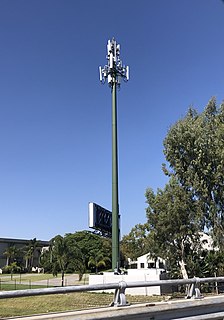
Telecommunications infrastructure in South Africa provides modern and efficient service to urban areas, including cellular and internet services. The Independent Communications Authority of South Africa (ICASA) is the watchdog of the telecommunications in the country.

In Internet activism, hacktivism, or hactivism, is the use of computer-based techniques such as hacking as a form of civil disobedience to promote a political agenda or social change. With roots in hacker culture and hacker ethics, its ends are often related to free speech, human rights, or freedom of information movements.

Cybercrime is a crime that involves a computer and a network. The computer may have been used in the commission of a crime, or it may be the target. Cybercrime may harm someone's security and financial health.

Damelin is a private college founded by Benjamin Damelin in 1943. Damelin has 17 campuses, and is owned by Educor group. Damelin offers degrees, diplomas and other higher qualifications, but is considered a college instead of a university due to the regulations for tertiary institutions in South Africa. Damelin is the oldest and most profitable education subsidiary owned by Educor. By November 2012, over one million students had graduated from Damelin.
Brian Krebs is an American journalist and investigative reporter. He is best known for his coverage of profit-seeking cybercriminals. Krebs is the author of a daily blog, KrebsOnSecurity.com, covering computer security and cybercrime. From 1995 to 2009, Krebs was a reporter for The Washington Post and covered tech policy, privacy and computer security as well as authoring the Security Fix blog. He is also known for interviewing hacker 0x80.

Ankit Fadia is an Indian self-proclaimed white-hat computer hacker, author, and television host. He is considered to be a security charlatan. His work mostly involves OS and networking tips and tricks and proxy websites.

The Internet has a long history of turbulent relations, major maliciously designed disruptions, and other conflicts. This is a list of known and documented Internet, Usenet, virtual community and World Wide Web related conflicts, and of conflicts that touch on both offline and online worlds with possibly wider reaching implications.

Anonymous is a decentralized international activist and hacktivist collective and movement primarily known for its various cyberattacks against several governments, government institutions and government agencies, corporations and the Church of Scientology.

During the Russo-Georgian War a series of cyberattacks swamped and disabled websites of numerous South Ossetian, Georgian, Russian and Azerbaijani organisations. The attacks were initiated three weeks before the shooting war began.
Ehud "Udi" Tenenbaum, also known as The Analyzer, is an Israeli hacker.
World of Hell was a grey hat computer hacker group that claims to be responsible for several high-profile attacks in the year 2001. It gained attention due to its high-profile targets and the lighthearted messages it has posted in the aftermath of its attacks.
TeaMp0isoN was a computer security research group consisting of 3 to 5 core members. The group gained notoriety in 2011/2012 for its blackhat hacking activities, which included attacks on the United Nations, NASA, NATO, Facebook, Minecraft Pocket Edition Forums, and several other large corporations and government entities. TeaMp0isoN disbanded in 2012 following the arrests of some of its core members, "TriCk", and "MLT".
Anonymous is a decentralized virtual community. They are commonly referred to as an internet-based collective of hacktivists whose goals, like its organization, are decentralized. Anonymous seeks mass awareness and revolution against what the organization perceives as corrupt entities, while attempting to maintain anonymity. Anonymous has had a hacktivist impact. This is a timeline of activities reported to be carried out by the group.

NullCrew was a hacktivist group founded in 2012 that took responsibility for multiple high-profile computer attacks against corporations, educational institutions, and government agencies.
RedHack is a Turkish Marxist-Leninist computer hacker group founded in 1997. The group has claimed responsibility for hacking the websites of institutions which include the Council of Higher Education, Turkish police forces, the Turkish Army, Türk Telekom, and the National Intelligence Organization others. The group's core membership is said to be twelve. RedHack is the first hacker group which has been accused of being a terrorist organization and is currently one of the world's most wanted hacker groups.

Trishneet Arora is the founder and chief executive officer of TAC Security, a cyber security company. He was named in Forbes 30 Under 30 2018 Asia list and Fortune India 40 Under 40 2019 List of India's Brightest Business Minds.
Pakbugs was a Pakistani-based security forum offering security releases updates, discussion of hacking, credit card fraud, phishing and other forms of computer crime; as well as trading in malware, bank login details and stolen credit card numbers. The forum was shut down after multiple raids by Pakistani Federal Investigation Agency on its members in 2010, in which five individuals were arrested, with the alleged founder suspected to remain at large in Riyadh.
Ghost Squad Hackers or by the abbreviation "GSH" is a politically motivated hacktivist team responsible for conducting cyber attacks on central banks, Fox News and CNN, leaking sensitive data of the United States Armed Forces, leaking sensitive data of the Israeli government, hijacking Afghanistan's Chief Executive's Twitter account, and much more. Led by the administrative de facto leader known as s1ege. The group's prime intent and focus is embedded on anti-governmental and organization cyber protests within current involvements of media speculation and real life happenings in 2021 to present.They are also a team in and part of the hacktivist group Anonymous.

Hack Forums is an Internet forum dedicated to discussions related to hacker culture and computer security. The website ranks as the number one website in the "Hacking" category in terms of web-traffic by the analysis company Alexa Internet. The website has been widely reported as facilitating online criminal activity, such as the case of Zachary Shames, who was arrested for selling keylogging software on Hack Forums in 2013 which was used to steal personal information.










